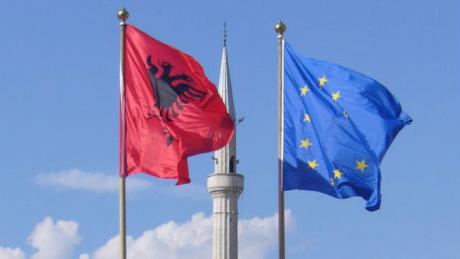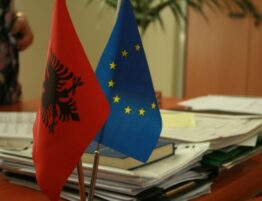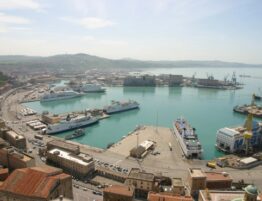
According to a recent study conducted by the Italian Institute for International Affairs (IAI) – which focuses on the analysis of evolutionary trends in public opinion towards European integration- when EU citizens are asked “are you in favor or not of the entry of Albania into the European Union?”, their answer is generally clear. While to some, the entry of Albania into the European Union could pose a risk for the future of the organization, to others, on the contrary, it would bring only positive effects. A careful analysis gives us to understand that the matter is far from simple.
Different perspectives and interpretative keys are involved, not only geopolitical ones, in connection with the redefinition of the borders of Europe, but also, and above all, those linked to humanitarian, religious and identity issues.
On 24th June 2014, the European Council approved the granting of the status of candidate country to Albania. The attempt to modernize the country promoted by Prime Minister Edi Rama, together with the positive results of the latest parliamentary elections, convinced also the last opposing countries, mainly Great Britain, Germany and France, who were doubtful about the nation’s actual ability to deal with the process of bringing Albania closer to the EU. On 27th June 2014, just three days later, the European Council confirmed its earlier decision and Albania became an official candidate for member-ship.
Because of its strong economic ties with Albania, Italy was one of the main advocates of the application. According to the latest census con-ducted by the Italian Embassy in Tirana, during the most recent years, the geographical proximity of the two countries has led to the birth of more than four hundred newcos in Albania, between Italian and Italo-Albanian joint ventures, concentrated mainly in the construction (35%), textile (21%) and agrifood (8%) sectors.
In general terms, amongst the immediately tangible benefits of the application for membership, e-specially from the economic point of view, there is a major expansion of the internal market combined with a consolidation of existing cooperation, together with increased trade and economic integration in the Mediterranean. With the strengthening of the Europe-Asia corridor, Albania will represent an expanding market for all European products, supplying cheap work-force due to significantly lower wages when compared to the ones of other Countries. Ac-cording to data collected by INSTAT (Albanian Insitute of Statistics) in 2013, the volume of the overall trade of the Republic amounted to 5.4 billion euro, an increase of 2.7% compared to 2012.
In general terms, EU countries account for about 68% of the market share; Italy, in primis, stands among the main trading partners (37.47%), followed by Greece, Turkey, Germany and Spain.
At a non-European level, on the other hand, China is present on the territory with 6.11% of the overall share of the market. The excellent figures for the first half of 2014 have confirmed the positive economic situation, show-ing an overall 10.3% increase in the volume of exchanges, compared to the first half of 2013 (source: Ministry of Foreign Affairs – Foreign Markets Info).
On the other hand, the reform of the judicial system along with the fight against organized crime and corruption are among the key challenges that yet remain to be faced. The Commission itself, with its latest Report to the Council on the work of the EU/Albania High Level Steering Group, accuses the Republic of not having taken sufficient measures to tackle corruption in the judicial system.
In the summary the report states that “Despite the reform of the legal system, the functioning of the judicial power is still not satisfactory. Corruption and organized crime still give rise to significant concerns. The government has radically changed the law and has created a large number of implementation structures; however, it still does not have the necessary tools to apply them properly. In order to strengthen democratic institutions and good governance, together with the rule of law and the respect for human rights and minorities, further concrete measures will therefore be necessary”. The importance of decentralization and professionalization of the Public Administration, which is still essentially politicized, is also stressed. Finally, there also were those who did not want Albania into the European Union mainly because of religious reasons, not considering that the Republic is officially a secular state in which the current level of religious practice within the different religions (Islam, Orthodox, Catholic and Protestant Christianity) is highly diversified. It is estimated that about sixty to seventy-five percent of the population is atheist or at least not religious. The words of the famous Albanian poet and intellectual Pashko Vasa epitomize this matter: “Mos shikoni kisha e xhamia Feja e shqiptarit është shqiptaria” which mean, “Do not look at churches and mosques, the religion of the Albanians is Albanity”.
In conclusion, even though in the past recent years Albania and its people have shown great strength of will and disposition towards change in view of the forthcoming entry into the European Union, from the economic point of view and the rule of law, there are still many efforts that the nation needs to make to meet the required standards. Nevertheless, we firmly believe and agree with the Undersecretary for European Affairs, Sandro Gozi, when he says, “it is absolutely crucial to recognize the status of candidate country to Albania, thus accelerating the accession process, since a European Albania will surely be of help in affirming the EU’s role of international political interlocutor”.
(Bologna Office – Linda Tontodonati – 0039(0)512750020)


